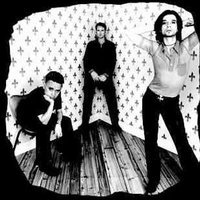"The copyrights situation may seem a bit complicated, but you are basically right about DM owning their own masters. You probably know most of this, but I'll go through it for those that are new to it. Depeche Mode are essentially self-managed, and have retained almost complete control over their music since the beginning. In 1984, the band founded Greataim Ltd., which technically was a company dealing in "Live Theatrical Presentations & Other Artistic & Literary Works". All of their finance regarding live and studio work would go through Greataim, which swiftly changed its name - first to to Demilune Ltd. that same year, and then to Depeche Mode Ltd. in 1992.
In 1988, the band also formed their own management, Rapid 5592, again changing the name to Masses Management that same year. This is where you would find Jonathan Kessler and Daryl Bamonte, but also John Joseph Fanger, who later worked in Depeche Mode Ltd., and also as Martin's personal assistant in Grabbing Hands Music Ltd., which is Martin's publishing company, formed in 1983. You often see John listed as JD Fanger of the DM office.
In 1992, for about a year Depeche Mode Ltd. was helped by CCS Directors Limited/CCS Secretaries Limited, who probably took care of book keeping etc., but in 1993, the band took over yet again, and brought John in to take care of the accounting. Most of the external companies involved in DM business seems to have basically just helped them set it up and get it running, before the band could then take over.
Venusnote Ltd. was founded in 1995, and the reason for that was simple: Alan leaving. They kept the Depeche Mode Ltd. name going, but changed its main operatives back to the Demilune name. Demilune also briefly (1994/1995) had an "exotic" branch, with help from the Waterlow Nominees/Waterlow Secretaries company.
Masses Management also stopped operating after Alan left, and eventually dissolved in 1998, with Jonathan Kessler being listed as a formal manager through his Baron Inc. Kessler also has a publishing company, Createhome Limited, where Dave has also been listed as a director since the start in 1992, but no known Dave-tracks have been published through them. So, as you could tell from the remasters, from 1995 onwards there was Demilune looking after everything pre-1995, and Venusnote everything post-1995. These two companies owned all of the masters for the entire 1981-2006 output, and this includes demos, outtakes and rarities from that era. What is interesting, though, is that Demilune dissolved in 2009, so Venusnote is now the longest running active DM company, and Alan is not involved in that. This begs the question, what about the pre-1995 masters? The answer is that there is probably nothing to worry about, because although it is practically inoperative, Depeche Mode Ltd. still formally exists, and they own the masters.
Martin owns the publishing for all of his songs through Grabbing Hands Music - even the 1981-1983 tracks that Sonet published, and he kept Sonet as distributor until 1992, when he switched to EMI. This is why you see EMI Music Publishing Ltd. next to it. That is simply licensing/distribution, and it means that EMI will collect the royalties for Martin. The same goes for JJSR, which is Dave's publishing company, set up in 2003. That is distributed/licensed through Universal, but Dave owns the rights. Martin also had an "overseas" branch for Grabbing Hands from 1992-2009, which you often see on the records.
Dave, Martin and Andy have also had two LLP's (limited liability partnerships) together. Those were Black Swarm LLP in the Playing the Angel-era, and Disbursements LLP in the Sounds of the Universe-era. Now, for the Delta Machine-era, they've set up an LLP called Fruity Generation.
I don't know anything about the Sony/Columbia deal, or BMG's recent acquisition of Universal's rights to Mute, but the worldwide deal that DM signed with EMI in 2008 played a central part in how Daniel managed to go independent again two years later. EMI told Daniel that the one band they wanted to keep was DM. I don't know anything about the other four bands they ended up with, but DM agreed to stay with EMI for one reason, and that was helping Daniel out. Mute and DM have been through a lot together, and the economical situation has frequently been dramatic. Daniel had to scrape together money from his own pockets to put out ULTRA back in '97, because the label was practically broke.
Daniel Miller is (in my humble opinion) an absolute hero, and I hope that DM fans will continue to support him through difficult times. It is very expensive to keep such a massive catalogue in print. EMI promised to do it, and I hope that BMG will too."




